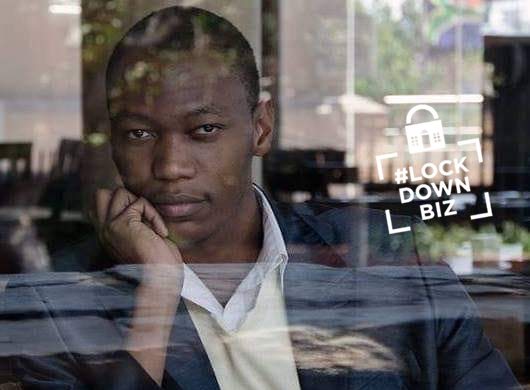We chatted to Zakheni Ngubo, founder and CEO at Syafunda, to get his take.

Zakheni Ngubo, founder and CEO at Syafunda
What was your initial response to the crisis/lockdown and has your experience of it been different to what you expected?
Zakheni Ngubo: Syafunda’s initial response was making sure that our line of communication with our teachers was well established and communicated. We also sought to synchronise and streamline our teacher and principal WhatsApp groups while ensuring that the Syafunda team was well prepared for the lockdown. This crisis has been accompanied by uncertainty; our organisation has focused its efforts on foreseeing how the pandemic will affect education in South Africa and adapt to the changes.
Comment on the impact of the Covid-19 pandemic on your organisation or economy as a whole.
Ngubo: Covid-19 put a halt on all the programmes and we had to suspend new rollouts and shift our focus to prioritise supporting and maintaining current projects and community. We have also had to shift our strategy from being school-centred integration to community and individual home or community-based support as our learners and teachers would not be at schools.
Our response to this was opening our offline system by hosting it online. We’ve also had to get creative about supporting users who have experienced data limitations and access to internet, part of this included heavily compressing the video materials and providing audio in MP3 format to account for limited mobile storage capacity on user devices.
How is your organisation responding to the crisis?
Ngubo: Times of crisis has a way of bringing out the best of us to innovate and collaborate to ensure not only that we overcome current challenges but develop systems and lessons that will help us be better prepared for the new reality. In light of this, the organisation has responded to the crisis in three main ways.
Firstly, we’ve opened the Syafunda Digital Platform for free to all learners and teachers to access video tutorials, books, study guides and assessments for grade 8 to 12. Secondly, we have centralised the My School section on the Syafunda website where teachers can create a school profile, upload and share resources with not just their learners, but learners throughout the country, along with a student-teacher chatroom where learners can ask questions and get answers from our registered teachers. Thirdly, we have worked with a range of partners, including DBE, PILO, NECT, CASME, to source materials and resources to distribute through our free Wi-Fi hotspots in schools and petrol stations.
In addition, as the restrictions are gradually being lifted, in the coming few weeks we are currently actively working on extending our free Wi-Fi hotspots across KZN to expand access beyond schools to include petrol stations so that learners without internet access are able to access educational material at no cost to them.
Comment on the challenges and opportunities.
Ngubo: The biggest challenge is the uncertainty that has accompanied this crisis. Different industries and companies, most of whom are our partners, are taking a knock in this crisis. It has pushed us to work on the premise of a post-Covid-19 world which is very different than the one we know. We have strategy sessions internally and with some of our partners and funders like Edge Growth and Old Mutual to do scenario planning with each of the current and upcoming projects to constantly re-evaluate our role in this environment. This has also been a way to keep the team engaged and connected at this time, allowing a surge of creativity and innovation.
Some of the opportunities we have noticed is the change in mindset regarding digital education, particularly with the DBE and teachers who had previously seen it an add-on rather than an essential part of learning. We have also seen parents being more proactive and involved in their children’s learning, which has been encouraging. We believe one of the positive aspects that will come from this is a reduction in data costs and making online education somewhat accessible to a significant proportion of learners.
How has the lockdown affected your staff? / What temporary HR policies have you put in place regarding remote working, health & safety, etc.?
Ngubo: As part of the team’s efforts to mitigate the spread of the virus, the organisation ensured that employees’ salaries were paid to allow for preparation prior to the lockdown being effective. We further allowed for flexibility on office hours and it was quite inspiring to see the team come together and support each other. Prior to the announcement of the lockdown, we had already been working on a migration strategy from office to working online so it became about finalising that process and making sure everyone had the resources and connectivity to work from home. We had to get extra internet routers, laptops etc., to ensure that by Thursday, everyone was sorted and well prepared.
Mamphela Ramphele and George Lindeque 24 Mar 2020 Your key message to those in the sector?
Ngubo: We now, more than ever, need an independent body or fund to regulate, consolidate ideas and efforts. This body should ideally represent key players and stakeholders in the sector to streamline all resources towards key clearly articulated outcomes. The four key goals that I think are salient are connectivity and access to information and digital resources, teacher training and support, curriculum enrichment and early childhood development (ECD).
While South Africa and the rest of the world has entered unchartered territory and uncertainty, this time does present an opportunity to explore how we can respond to challenges in education through digital learning. It also presents an opportunity to possibly re-look at re-inventing and revamping the entire education system to respond to the South African reality and context.
What do you predict the next six months will be like?
Ngubo: We foresee increased cooperation and better co-ordination across different actors towards the education and technology sector through forging and sharing of resources. We are also anticipating the prioritisation of funding and increased investment into infrastructure that supports and facilitates the gradual shift towards digital education. The boundaries between physical and digital boundaries have been disrupted and blurred so we are likely to see a shift towards blended learning, the co-creation of content and the emergence of open online communities and open source content that is more diverse in context and languages.




























































